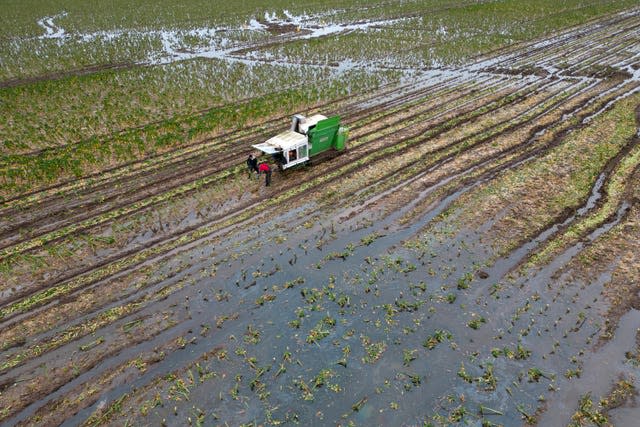Farmers’ confidence in England and Wales has fallen to an all-time low with more than four-fifths saying they are being adversely affected by the wet months, sector leaders have warned.
All areas of farming – arable, livestock, poultry, horticulture and dairy – are expected to reduce production over the next year, according to a National Farmers’ Union (NFU) poll.
Almost 800 farmers and grower members were surveyed between November 21 and January 5 about the challenges they face and their expectations for the coming year.
The results published on Monday showed that confidence in both the short and medium term – farmers’ views on the next year and the next three years – are at their lowest levels since the annual survey began in 2010.
Arable and livestock farmers were found to be particularly pessimistic about both.
Unrelenting wet conditions in the autumn played a major role, according to the NFU, with 82% of survey respondents saying their farm businesses had been negatively affected.
But since January, heavy rain and storms continued to hit the UK until April, meaning that if the survey were carried out today the results would probably be worse.
NFU President Tom Bradshaw said the extreme weather was part of a “wonderful storm of events coming together”.
“I don’t think anyone can underestimate the impact of this exceptional weather over the past 18 months,” he said.

These conditions added to other problems for English and Welsh farmers, such as rising costs, inflationary pressures, labor shortages and cheaper imports, he said.
The survey results indicate that the highest percentage of farmers see the phasing out of the old EU Basic Payment Scheme towards new subsidy schemes as an issue that will have a negative impact on their businesses in 2024.
Following closely in second place was the issue of high input costs such as fuel and fertiliser, which came out highest in last year’s survey.
Meanwhile, concerns about farm gate prices – the amount farmers are paid for their produce before transport costs – rose by 10 percentage points.
The NFU has warned that many farm businesses are ultimately at risk this year, citing Office for National Statistics figures that more than 8,000 farms were lost between 2019 and 2023.
Their survey found that 65% of farmers said their profits are declining or their business may not survive, compared to 50% last year.
“Confidence has fallen after months of devastating floods, unsustainably high production costs and low market yields, and against a backdrop of reduced farm support as we transition to a new Inland Agricultural Policy and associated farm support,” Mr Bradshaw said.
“Any business owner knows that without confidence and a steady flow of cash, that business will find it difficult to reinvest and remain viable.”
Experts recently warned that lower yields from key crops could lead to higher food prices if the losses cannot be offset by imports from a stronger global commodity market.
But Mr Bradshaw argued that relying on imports as climate change threatens food systems around the world is “naive at best and foolish at worst”.
“Britain cannot afford to lose its own feeding capacity,” he said.
In its manifesto for the general election, the Union outlined solutions that political parties could adopt to tackle the collapse in farmers’ confidence and to protect indigenous food production.
These include rewarding farmers fairly for their role in mitigating flood risk, transitioning smoothly to new environmental schemes open to all farmers and ensuring long-term profitable food-producing businesses.
The Union is also calling on politicians to establish minimum standards to promote fair and functional supply chains and to establish core production standards relating to agri-food imports.
Mr Bradshaw said: “Farmers bear the risk within the supply chain and with the huge volatility we have seen in input markets and output prices in recent years.
“That risk is becoming too high for many businesses to take and we need a strong foundation now to underpin our food production for the future.”
When asked about voting attitudes among his members, he said the rural vote is “still very much to be desired”, adding that the demographic is looking for policies that will underpin profitable food production. .
Farming Minister Mark Spencer said: “I applaud all our farmers and their hard work to put food on our tables, day in and day out.
“Supporting Britain’s farmers remains at the heart of this Government’s approach, from maintaining the £2.4 billion annual budget, ensuring fairness in our supply chains and launching the largest ever grant offer for farmers in 2024.
“Our farmers are facing one of the wettest spells on record in England, and I have seen the impact of that first hand.
“The Farming Recovery Fund is offering support to farmers to help them recover from uninsurable damage and we are looking at how we can expand the scheme and improve support for those affected.
“I will continue to listen and work with farmers to see what additional support can be offered during this challenging time.”